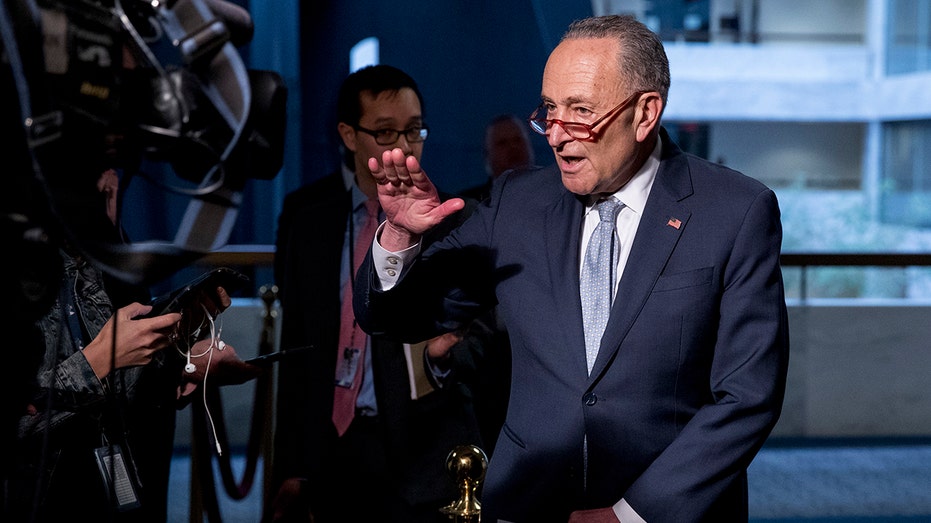Senate parliamentarian rules in favor of Democrat’s reconciliation effort
Move opens door for Democrats to approve more measures along party lines in the Senate
WASHINGTON — The Senate’s nonpartisan parliamentarian Monday ruled in favor of a Democratic effort to pass additional legislation through a process called reconciliation, according to a spokesman for Senate Majority Leader Chuck Schumer (D., N.Y.), opening the door for Democrats to approve more fiscal measures along party lines in the Senate this year.
Democrats have used reconciliation once this year to pass the $1.9 trillion coronavirus relief package, and lawmakers had expected to be limited to using it only one more time this year. With the parliamentarian’s new advice to lawmakers, Democrats could now possibly use it a third time to skirt the 60-vote threshold necessary for most legislation to pass in the Senate.
“This confirms the leader’s interpretation of the Budget Act and allows Democrats additional tools to improve the lives of Americans if Republican obstruction continues,” the spokesman for Schumer said.
MANCHIN REJECTS BIDEN'S CORPORATE TAX HIKE
The spokesman said Schumer hasn’t decided whether to move forward with using reconciliation again and that “some parameters still need to be worked out” around its use.
The ruling will give Democrats more room to maneuver to pass President Biden’s agenda, including his recently announced $2.3 trillion infrastructure plan. The White House is expected to roll out another large package in the coming weeks, this time focused on child-care and antipoverty efforts.

The Senate’s nonpartisan parliamentarian Monday ruled in favor of a Democratic effort to pass additional legislation through a process called reconciliation, according to a spokesman for Senate Majority Leader Chuck Schumer (D., N.Y.), opening the do
A spokesman for Senate Minority Leader Mitch McConnell (R., Ky.) didn’t respond to a request for comment.
Republicans have widely criticized the $2.3 trillion plan, attacking its wide scope and proposed tax increases on corporations. The hardening GOP opposition had left Democrats already preparing to use reconciliation to pass the infrastructure plan, possibly combining it with the coming antipoverty legislation to muscle a huge package through Congress along party lines.
Under the reconciliation process, lawmakers pass a budget resolution that then provides committees with instructions to craft legislation meeting the budget’s target. Because budget resolutions are tied to the fiscal year, lawmakers had been limited to using reconciliation once per fiscal year.
But the parliamentarian advised lawmakers that they can edit the underlying budget resolution, giving committees additional instructions for meeting the new target. It is unclear if there will be a limit on the number of times lawmakers can edit a budget resolution each fiscal year.
CLICK HERE TO READ MORE ON FOX BUSINESS
For the $1.9 trillion relief plan, Democrats approved reconciliation legislation tied to the budget for fiscal year 2021, which ends Sept. 30. Instead of turning to the fiscal year 2022 budget for the next bill, they could now likely pass at least one other piece of legislation tied to a revised budget for fiscal year 2021.
While reconciliation enables lawmakers to avoid the filibuster in the Senate and pass legislation along party lines, it limits what measures lawmakers can approve. Provisions passed through reconciliation must relate directly to the budget, barring many policy plans from consideration. Spending and tax measures are generally eligible to be included in reconciliation.
Earlier this year, Democrats had sought to raise the minimum wage to $15 an hour as part of the $1.9 trillion relief package. The parliamentarian ultimately ruled that raising the minimum wage had a budgetary impact only incidental to its policy aim, forcing lawmakers to cut the provision from the final bill. Some Democrats had pushed for leadership to ignore the parliamentarian’s ruling, while other Democrats had said they opposed raising the minimum wage to $15 an hour.
GET FOX BUSINESS ON THE GO BY CLICKING HERE
Some elements of Biden’s $2.3 trillion infrastructure proposal may face a similar fate, according to lawmakers and aides, including some of its proposed labor protections.




















